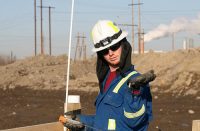As a car-free mother of twins, I have had my arguments with Translink drivers over the girth of my double stroller (I occupied the space of two seats for the three of us). The double stoller was our family vehicle; it carried all our precious belongings, and for the (rather brief) periods when neither of my babies insisted upon being carried, it saved my back from mulishness.
As a car-free mother of twins, I have had my arguments with Translink drivers over the girth of my double stroller (I occupied the space of two seats for the three of us). The double stoller was our family vehicle; it carried all our precious belongings, and for the (rather brief) periods when neither of my babies insisted upon being carried, it saved my back from mulishness.
But we’ve moved on from strollers to questions of the kind of parents we want to be. I want to offer my children choice, but not just the choice of university, or city, or profession. These choices, of course, make big differences. None of them, however, cuts against the grain of the human condition that we have been handed. And that grain is seriously splintered: the smarter, the more upwardly mobile, the more itinerant, the more classless and capable, the more likely our kids are to be part of perpetuating injustice, cruelty, and a demise of the future at a very large scale. The most viable and valuable sense of choice I might foster in my children is a choice to decouple their fortune from the removal of options from those not born so fortunate, and those not yet born. I know I won’t be able to tell it to them. But it is certainly up to me to give them memories that might turn into habits. I can give them a childhood of getting around happily without an automobile. So why wouldn’t I do that?
I know my family has options that are not available to most people around the world, nor to the bottom half of the income and opportunity distribution in our own city, Vancouver. Nevertheless, we are not wealthy. To put things in slightly subtle terms, we qualify for the Canada Child Tax Benefit, a monthly income supplement for low and middle income families. I intend in no way to make light of the challenges of so many families who lack the option of living in close proximity to high-quality public transit and safe, walkable streets; nor those who depend upon a private vehicle for professional or personal responsibilities. The case I hope to make is to those who, like us, are free from these real constraints. It is not a case of sacrifice. It is about the relationship of a car-free lifestyle choice to good parenting in liveable cities, for those living in them, and those interested in building new lives in them.
Am I trying to argue that car-free with kids is easier than the car dependent alternative? Well, not always. We have gotten rained on. We have gotten stuck at the bottom of train stations with out-of-service elevators – where the wordless response of passers-by to help heft our stroller up the stairs inspired. We have had to wait long past bedtime at bus stops (but the wee ones have also benefitted on such occasions from the cookie stash of young backpackers, the popcorn samples of travelling corporate reps, and the fun music of near-peak ravers). I have had to run flat out, and still on occasion I have been late to pick up my children due to late connections. But let’s put these aggravations in the car rider perspective.
I know that my children are less likely to be the victims of a car accident. They spend less time breathing exhaust, and are less likely to suffer from asthma, or obesity, or other illnesses associated with sedentary lifestyles. For middle and upper class kids who drive in cars, the differences in these outcomes may not be significant. But here are some other things that car-free kids learn on a daily basis: street awareness, awareness of the geography of streets and transit patterns, the numbers and routes of buses and trains, traffic and street signage.
Active travel is quality time. And transit offers glimpses into different social and cultural worlds we would not otherwise get, a rare vestige of a social levelling force. A chance to de-capsulize our lives.
You might think that our car-free household is simply postponing the inevitable reckoning. That we are to car ownership like attachment parents to the ‘cry it out’ method: simply delaying the eventuality of our children learning the hard way that sometimes, you have to cry your lonely self to sleep. Preteen social ostracization may come to those who wait, or perhaps it will be hockey, that road trip to see the northern lights, whatever it is that thwarts every middle class family with the best car-free intentions.
I believe that we are all played a cruel trick to the extent that we are convinced that we are really living when we can separate ourselves out as radical individuals. Cars and their whole apparatus are key forces that separate us in this way. I think this phony image of the very idea of the individual, going places, alone, is untenable, and that it prevents us from doing what makes us happy: being together. Bouncing ideas, not cloistering them. Breaking bread, not hoarding it. Having babies is perhaps the most straightforward way to reveal the contradictions of the quest for individualism. (And highly recommended, by the way, for those who haven’t given it a try.)
We had an extended stay at a family cottage this summer. I took the occasion near the end of the trip to ask the girls whether they preferred the country or the city for living. “The city,” they both replied. Why? Brookie piped in loudest and first: “Because you don’t have to drive in a car all the time in the city. And the car is too tight for me.”
Haven’t heard of the stroller wars? This’ll fill you in.
Meg Holden is Associate Professor of Urban Studies and Geography at Simon Fraser University. Her teaching and research cross the domains of pragmatic approaches to urban and social sustainability, sustainable redevelopment projects, sustainability and quality of life assessment, and social and policy learning.
Meg Holden is Associate Professor of Urban Studies and Geography at Simon Fraser University. Her teaching and research cross the domains of pragmatic approaches to urban and social sustainability, sustainable redevelopment projects, sustainability and quality of life assessment, and social and policy learning.











